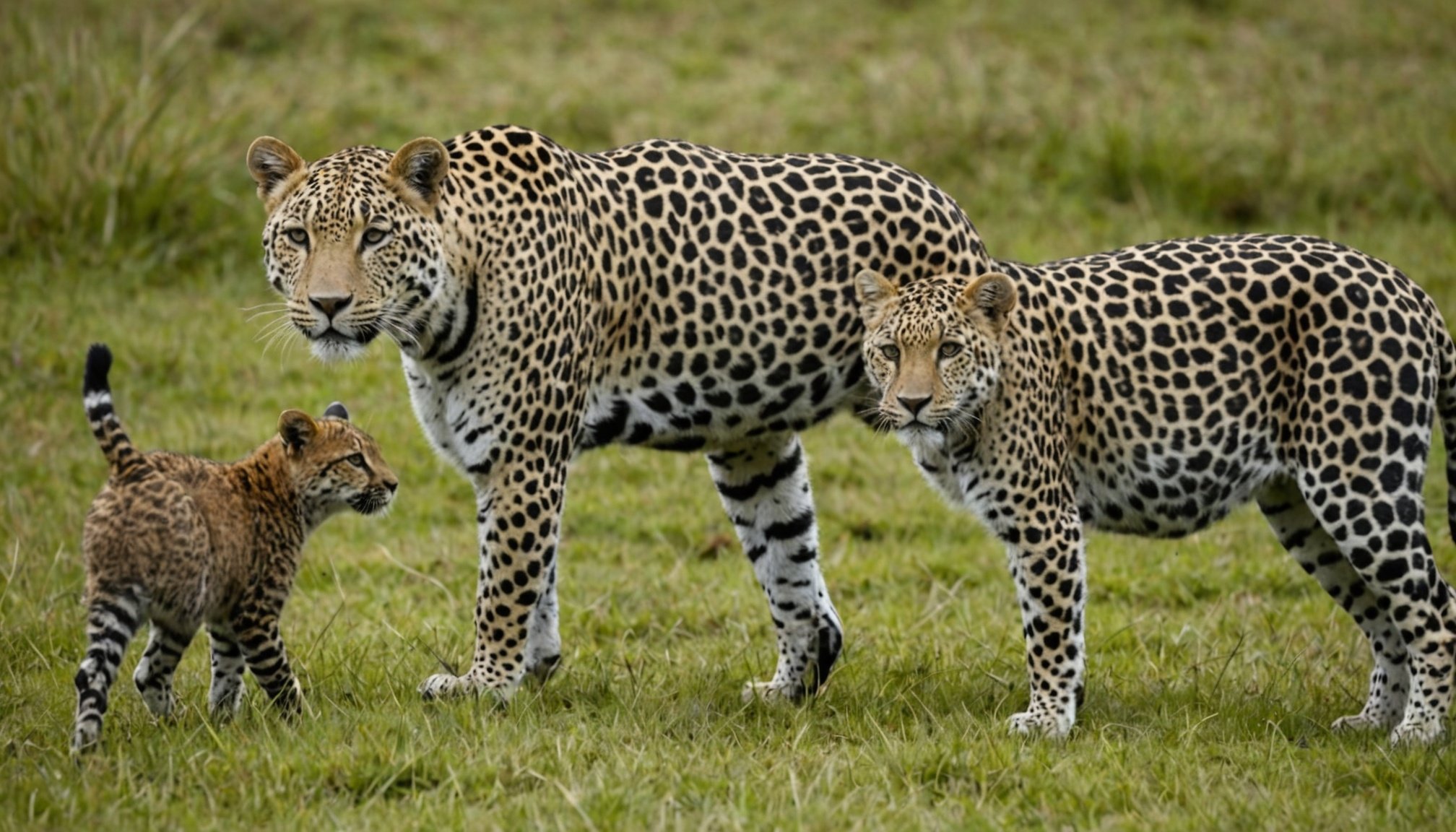Unveiling UK Educational Initiatives: Integrating Wildlife Conservation in Universities and Schools
The Importance of Wildlife Conservation Education
In an era where environmental challenges are at the forefront of global discussions, educating the next generation about wildlife conservation is more crucial than ever. The UK, with its rich biodiversity and commitment to sustainability, is at the vanguard of integrating wildlife conservation into both school and university curricula. This approach not only enriches the learning experience but also fosters a sense of responsibility and stewardship among students towards the natural world.
Why It Matters
Wildlife conservation education is not just about teaching facts; it’s about inspiring students to become active participants in protecting the environment. As the Marine Conservation Society aptly puts it, “Educating children about marine conservation is not just about teaching them facts; it’s about inspiring them to become the next generation of ocean stewards.”[1]
Also read : Innovative approaches by uk scientists to reduce bird strikes in wind farms
Innovative School Programs
Several innovative programs in UK schools are making significant strides in wildlife conservation education.
The UCL Ocean Health Challenge
One of the most engaging programs is the UCL Ocean Health Challenge, a national engineering design challenge open to secondary school and college students aged 11-18. This challenge, accredited by the British Science Association’s CREST Awards scheme, encourages students to think creatively about the complex issues facing our oceans and develop practical skills in engineering and design.
Also to see : Uncovering the national trust’s essential role in uk wildlife conservation efforts
Key Features:
- Comprehensive Learning Experience: Students work on real-world problems related to ocean health.
- Interdisciplinary Approach: Combines engineering, design, and environmental science.
- Community Engagement: Encourages collaboration and innovation among students from different schools.
As the UCL Engineering Team notes, “The Ocean Health Challenge is a fantastic way to inspire young people to think about the complex issues facing our oceans and to develop practical skills in engineering and design.”[1]
Marine Conservation Society Initiatives
The Marine Conservation Society (MCS) is another key player in educating children about marine conservation. Here are some of their initiatives:
Ocean Literacy:
- Provides educational materials and activities to help children understand marine life, coral reefs, and the impact of plastic pollution.
- Encourages hands-on learning through beach cleanups and other community activities.
Community Engagement:
- Offers membership programs and public events to involve the community in marine conservation efforts.
- For example, their General Election conversation pack helps individuals become ocean advocates during election seasons[1].
University Programs in Conservation Ecology
Universities in the UK are also at the forefront of conservation ecology education, offering comprehensive programs that combine theoretical knowledge with practical, hands-on learning.
University of Exeter’s MSci in Conservation Biology and Ecology
The University of Exeter’s MSci program in Conservation Biology and Ecology is a prime example of how universities are integrating wildlife conservation into their curricula. Here’s what makes this program stand out:
Course Content:
- Extensive Fieldwork: Students participate in field courses in the UK and international locations, led by wildlife specialists.
- Research-Led Learning: The program includes an advanced research project in the final year, allowing students to work on a specialized area aligned with one of the university’s leading research groups.
- Interdisciplinary Modules: Modules such as “Ocean Management and Conservation” and “Ecology and Conservation” provide a broad knowledge of core biological and ecological principles[4].
Hands-On Learning:
- Students gain practical skills in wildlife identification, data handling, and ecological consultancy.
- The program includes a two-week intensive field course where students develop their scientific field-research, debating, and presentation skills[4].
Practical Insights and Actionable Advice for Educators
For educators looking to integrate wildlife conservation into their curriculum, here are some practical insights and actionable advice:
Integrating Conservation into the Curriculum
Cross-Curricular Approach:
- Incorporate wildlife conservation into various subjects such as biology, geography, and design technology. This holistic approach helps students understand the interconnectedness of environmental issues.
- Biology: Explore the physical characteristics of ecosystems, the impact of human activities on wildlife, and conservation strategies.
- Geography: Investigate environmental challenges such as habitat destruction and strategies for sustainable development and management of natural environments[1].
Real-World Examples:
- Use case studies of local conservation projects to illustrate the practical applications of conservation science.
- Invite guest speakers from conservation organizations to share their experiences and insights.
Community Involvement:
- Encourage students to participate in local conservation efforts, such as beach cleanups or wildlife surveys.
- Collaborate with local conservation groups to develop educational materials and activities that are relevant and engaging[1].
Additional Resources and Initiatives
There are several additional resources and initiatives that educators and students can leverage to enhance their learning experience.
Educational Resources from Marine Conservation Society
The Marine Conservation Society offers a range of educational resources, including lesson plans and activity sheets, that can be integrated into school curricula. Here are some key resources:
Educational Materials:
- Lesson plans on marine life, coral reefs, and plastic pollution.
- Activity sheets for hands-on learning.
- Community engagement tools such as the General Election conversation pack[1].
University of Somerset’s Animal Management, Ecology and Conservation Program
The University of Somerset’s Cannington Campus offers a program in Animal Management, Ecology and Conservation that provides students with valuable theoretical and practical knowledge. Here are some highlights:
State-of-the-Art Facilities:
- Students have access to a state-of-the-art Animal Management Centre with an extensive animal collection.
- External habitat conservation areas are used for further ecological and conservation experience[2].
Field Skills Development:
- On-campus conservation areas are used to develop field skills.
- Partnerships with organizations like the Wildfowl and Wetlands Trust (WWT) provide students with real-world learning experiences[2].
Table: Comparing University Programs in Conservation Ecology
Here is a comparative table highlighting some of the key features of university programs in conservation ecology:
| University Program | Key Features | Fieldwork Opportunities | Research Focus |
|---|---|---|---|
| University of Exeter’s MSci | Extensive fieldwork, research-led learning, interdisciplinary modules | UK and international locations | Advanced research project in final year |
| University of Somerset’s Program | State-of-the-art facilities, external habitat conservation areas | On-campus and off-campus conservation areas | Practical knowledge in animal management |
| Natural Environment Investment Readiness Fund (NEIRF) Projects | Focus on nature market initiatives, green finance, biodiversity net gain | Various pilot sites across England | Developing scalable investment models for nature recovery |
Quotes from Experts and Participants
Here are some insightful quotes from experts and participants that highlight the importance and impact of these educational initiatives:
“By integrating marine conservation into our curriculum, we are not only teaching science and geography but also fostering a sense of responsibility and stewardship among our students.” – Teacher, UK Secondary School[1].
“The Ocean Health Challenge is a fantastic way to inspire young people to think about the complex issues facing our oceans and to develop practical skills in engineering and design.” – UCL Engineering Team[1].
“Educating children about marine conservation is not just about teaching them facts; it’s about inspiring them to become the next generation of ocean stewards.” – Marine Conservation Society[1].
Integrating wildlife conservation into educational curricula is a vital step towards ensuring the long-term health of our planet. Programs like the UCL Ocean Health Challenge, initiatives by the Marine Conservation Society, and university programs such as those at the University of Exeter and Somerset, are all contributing to a more informed and engaged young population.
By leveraging these resources, educators can make a significant impact on how children perceive and interact with the natural world. As we move forward in this critical era of climate change and environmental degradation, it is imperative that we equip our children with the knowledge, skills, and passion to protect our world for future generations.
Additional Resources for Educators
For educators looking to delve deeper into these initiatives, here are some additional resources:
CREST Awards: For more information on how to apply for CREST Awards and integrate them into your teaching, visit the British Science Association’s website[1].
Marine Conservation Society Educational Materials: Access a range of educational resources, including lesson plans and activity sheets, from the MCS website[1].
University of Exeter’s MSci Program: Explore the various modules and research initiatives offered by the University of Exeter’s MSci program in Conservation Biology and Ecology[4].
By embracing these educational initiatives, we can ensure that the next generation is well-equipped to make a positive impact on the world’s wildlife and natural environments.











